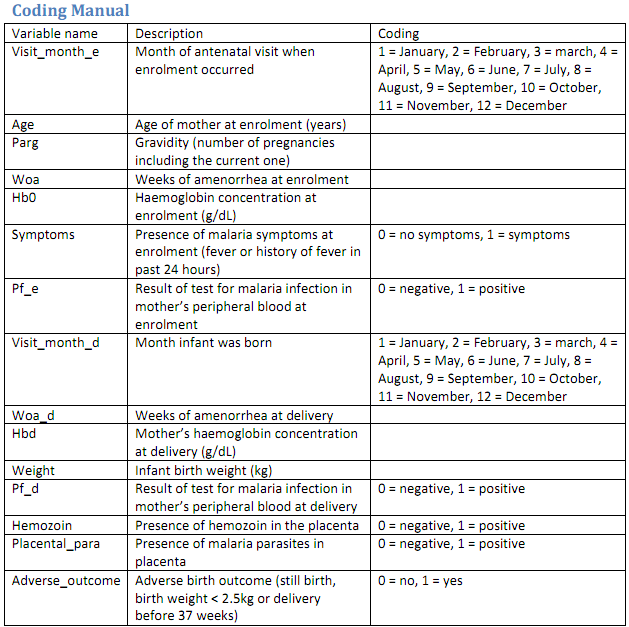Task
Your task is to answer a set of research questions using the supplied data set (‘malaria data set.sav'). Details about the study generating the data, and the data coding manual are provided in a separate document which should be read in conjunction with this assessment outline.
In your analytical report you are required to answer each of the following research questions:
1. Is there a difference in haemoglobin concentration at enrolment between women with detectable peripheral malaria parasites and those without detectable parasites?
2. Is mother's haemoglobin concentration at delivery related to the presence of malaria parasites in her placenta?
3. Do the women's haemoglobin concentrations change between enrolment and delivery?
4. Based on the enrolment data, is there any evidence that malaria has a seasonal pattern in Burkina Faso?
5. Is there an association between having an adverse birth outcome and having hemozoin present in the placenta?
6. Is there a relationship between infant birth weight and the time of year that the infant was born? Use quarters to describe time of year (eg, January - March, April - June, July - September, October - December).
7. Is there an association between infant birth weight and week of amenorrhea at delivery? If so, how well does week of amenorrhea at delivery predict infant birth weight and what is the predicted birth weight for an infant born at 40 weeks gestation?
8. Do mother's age or haemoglobin concentration at enrolment influence infant birth weight, after adjusting for weeks of amenorrhea at delivery?
Summary of the study and background
- The study was conducted to investigate aspects of maternal and infant health in rural Burkina Faso.
- The study recruited pregnant women between November 2010 and October 2011. Women who met the study inclusion criteria were approached to participate in the study during their antenatal visit to the study clinic, and all women enrolled provided informed written
consent.
- Clinical and demographic data were collected for each woman during her antenatal visit. Matched clinical data were also collected at the time of delivery for enrolled women who delivered in the study clinic.
- The routine standard of care at each antenatal visit in Burkina Faso is a physical examination, iron and folate supplementation, and chemotherapy for malaria and parasitic worms.
- In addition to standard care, this study collected blood samples at the antenatal visit and at birth for diagnosis of malaria and measurement of haemoglobin concentration. Placental samples were also collected at birth for the purpose of detecting placental malaria
infections.
- Placental malaria is a threat to infant health in the study area. Previous studies in Africa have linked placental malaria to adverse birth outcomes such as reduced infant birth weight and still or premature birth.
- Placental malaria can develop anytime during the pregnancy and is identified by the presence of hemozoin in the placenta or the presence of malaria parasites in the placenta. Not all peripheral malaria infections develop into placental malaria.
The dataset and coding manual
The dataset for analysis (‘malaria data set.sav') contains a sub-set of data for 640 women who were enrolled in the study. Missing values in the dataset are represented by ‘.' which represents a ‘system missing' value in SPSS (this means it is automatically recognised by SPSS as a missing value). Participant identification numbers have been removed from the dataset for ethical reasons. The data has been cleaned and is ready for analysis.

Download:- malaria data set.rar